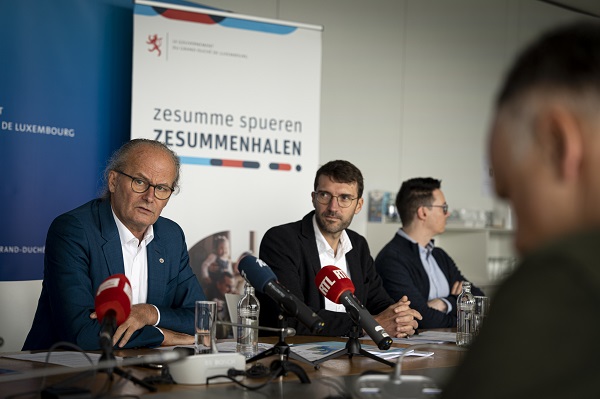 L-R: Claude Turmes, Luxembourg's Minister for Energy; Simeon Hagspiel, Ministry of Energy and Spatial Planning;
Credit: MEA
L-R: Claude Turmes, Luxembourg's Minister for Energy; Simeon Hagspiel, Ministry of Energy and Spatial Planning;
Credit: MEA
During a press conference on Wednesday 19 October 2022, Luxembourg's Minister for Energy, Claude Turmes, presented the update of the emergency plan relating to the security of natural gas supply in the Grand Duchy.
The escalation of Russian military aggression against Ukraine since February 2022 has led to a sharp decrease in gas supply and there is a real risk of a complete disruption of supply from Russia, warned Luxembourg's Ministry of Energy and Spatial Planning.
To cope with this reduction in Russian gas deliveries, the Member States of the European Union (EU) agreed on a voluntary (in a first phase) reduction of natural gas demand by 15% from 1 August 2022 to 31 March 2023. Currently, Luxembourg is achieving its target of reducing consumption by 15%. In August, the reduction corresponded to approximately 37% and in September, this corresponded to approximately 26% compared to the reference years.
Minister Turmes commented: "The current figures show that in Luxembourg, everyone - the State, the municipalities, the companies and the citizens - answers the call and saves energy in a consistent way. I thank everyone for their contribution to these first results. On the other hand, we must remain cautious: if the winter promises to be very cold, the consumption of gas linked to heating will probably increase considerably. So I still strongly call for energy saving efforts!"
Apart from measures to reduce the demand for natural gas, EU Member States have also agreed on an update of the emergency plans relating to the security of natural gas supply of the various Member States. members. These plans contain the measures to be taken to eliminate or mitigate the impact of gas supply disruptions.
In Luxembourg, a first emergency plan was established in 2017 and updated in 2020. The latest update is designed to further strengthen Luxembourg's preparations for the risks arising in the natural gas sector taking into account the current geopolitical context. From February 2022, It was prepared in close consultation with stakeholders.
The update contains a precise definition of protected customers and priority levels assigned to four categories of customers as part of the different measures to be adopted depending on the situation. Protected customers are all residential customers, essential services (healthcare services; essential social care services; emergency and security services) as well as district heating installations, insofar as they supply heating to protected customers, and only for the volumes necessary for the heating of said customers.
The priority levels assigned to four categories of customers within the framework of the different measures to be adopted depending on the situation are as follows, with "N4" (level 4) corresponding to the one to be offloaded first and level 1 to be offloaded last:
- N4: non-residential customers directly connected to the natural gas network; protected customers, educational establishments and electricity production and cogeneration plants are excluded;
- N3: non-residential customers with an installed or subscribed capacity greater than 2 MWh/h or an annual consumption greater than 1 GWh/year; protected customers, educational establishments and electricity production and cogeneration plants are excluded;
- N2: power generation and cogeneration plants;
- N1: protected customers, schools and non-residential customers with an installed or subscribed capacity less than or equal to 2 MWh/h and an annual consumption less than or equal to 1 GWh/year.
Luxembourg's natural gas supply security emergency plan defines three national crisis levels as well as the measures to be taken to eliminate or mitigate the impact of gas supply disruptions. The measures are not strictly linked to the crisis level, but can be taken in all crisis levels depending on the specific situation. The national crisis levels are:
- Early warning: when there is concrete, serious and reliable information that an event may occur, which is likely to significantly affect the state of supply and likely to trigger the alert or emergency level;
- Warning: when there is a supply disruption or exceptionally high demand for gas, which significantly affects the state of supply, but the market is still able to cope with this disruption or this demand without the need to resort to non-market based measures;
- Emergency: in the event of exceptionally high gas demand or a significant interruption in supply or other significant deterioration in the state of supply and in the event that all relevant market-based measures have been implemented without sufficient gas supply to meet the remaining gas demand, so that additional, non-market-based measures must be put in place, with a view, in particular, to safeguarding gas supplies for the benefit of protected customers.
The ministry confirmed that Luxembourg's security of supply is currently ensured and none of these three national crisis levels have been activated.
"The update of the emergency plan relating to the security of natural gas supply provides us with a toolbox that allows us to react to different scenarios with appropriate measures to guarantee security of supply", concluded Minister Turmes.









